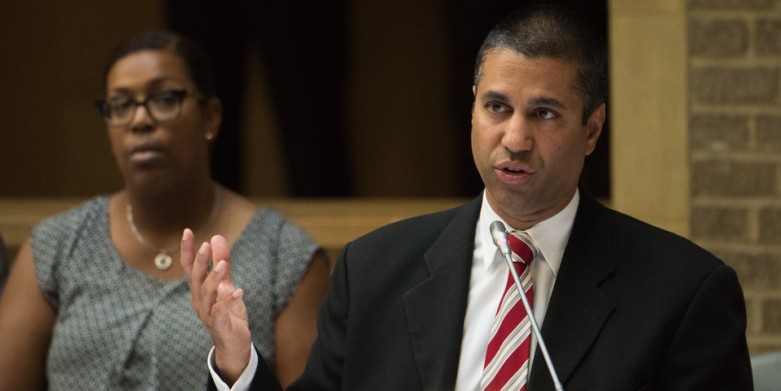
Ajit Pai Won't Have the Last Word on Net Neutrality
I spoke last week during a panel discussion on Net Neutrality at the inaugural event of the Open Markets Institute (following a noteworthy speech from Sen. Al Franken on the principles that should guide an open internet). You can read a lightly edited version of my remarks below and check out the video at the bottom of the post.
One good thing I’ll say about Facebook is that it’s always reminding me how long we’ve been having this fight.
Every time I’m grabbing my megaphone to go down to protest at the FCC, it always shows me a picture of me holding that megaphone at the FCC from 2007 or 2010 or 2014 … or last week.
And at first that can be a little discouraging. Like, we have to do this again? But of course we do.
These aren’t short-term fights; they’re generational. It takes a huge, diverse and dynamic coalition to win these fights.
But the public is with us. The FCC has gotten more than 22 million comments so far on Net Neutrality — 22 million! — and more than 98 percent of the ones that aren’t pre-written templates support strong Net Neutrality and Title II.
Gandhi is often misquoted as having said: “First they ignore you, then they laugh at you, then they fight you, then you win.” But it’s a good line even if he never said it.
Though in the case of Net Neutrality it was more like: First they ignore you. Then they series-of-tubes you. Then they sue you. Then they hire a bunch of lobbyists. Then they slander you. Then they try to sell you a fake compromise.
But then they lose in court and you organize millions of people. And then millions more. And then they pretend they were with you all along.
And then you win. (For now.)
And we did win in 2015 — with a 180-degree reverse at the FCC that ended with the strongest rules on solid legal footing.
And then we won again in court — twice.
Which is what makes the current attack on Net Neutrality so ridiculous.
Every anti-Net Neutrality Op-Ed or industry statement makes a reference to “ending the regulatory ping pong.” (It’s almost like they’re reading from the same set of talking points.) But the reality is the ISPs are the only ones playing that game.
We’ve got laws on the books, rules in place and court victories to protect those rules. There is zero uncertainty except that created by AT&T, Comcast, Verizon and FCC Chairman Ajit Pai.
We know the ISPs tell one story on Wall Street and a completely different one in Washington. Or to use the scientific term for it: lying.
The idea that this particular rule — the restoration of Title II authority — negatively impacted investment or influenced the construction and upgrading of broadband networks is fantastically wrong.
The irrefutable fact is that the period since February 2015 has been one of the most active periods of broadband deployment in history. That’s clear whether you look across the board at each company’s spending, read the statements they make to their own investors, or see the high-speed services they’re rolling out.
Oh yeah, and that was also true for investment in the other end of the market in over-the-top programming and edge investments. Net Neutrality has been a boon for the entire internet ecosystem.
Since we’re at an Open Markets event, we should talk about antitrust. I'm a strong advocate for greater antitrust enforcement and would happily talk about a number of mergers that need to be blocked right now.
But antitrust alone can’t protect the open internet. It isn’t designed to handle the array of harms to businesses that could be stifled but don’t compete directly with ISPs — let alone to contend with the threats to innovation, free expression and popular organizing on a non-neutral net.
The reality is that we need better antitrust enforcement and we need the strong Net Neutrality rules on the books. As Matt Stoller at the Open Markets Institute told me the other day: “Just because you have cops chasing people who are speeding doesn’t mean you can get rid of stop signs.”
Congress doesn’t need to legislate on Net Neutrality. What it needs to do is rein in Ajit Pai and the Trump FCC and get them to enforce the laws and rules already on the books.
Of course, I’m not so naive to think that Pai isn’t going to go forward with a vote to take away Title II and probably erase the rules altogether as soon as December.
But that won’t be the last word. Given the arbitrary and capricious way the agency has proceeded, I like our chances in court.
We also know that as soon as the FCC votes, all the ISPs are going to run to the Hill and offer some legislation that’s 5 percent less awful than whatever Pai does.
They’ll try to convince the big-platform companies to go along and join in a regulation-killing race to the bottom.
The whole ISP strategy is basically cribbed from Darth Vader: “Come to the dark side … join me, together we can rule the galaxy.”
But the mistake they’ll make — the one they keep making — is assuming eight companies can get in a room to “work it out.” Those backroom deals are fuel for a new anti-monopoly movement.
Net Neutrality has always been pushed from the outside in and the bottom up — and nobody is going to hate their cable company any less because they’re worried about Google and Facebook. They can do both.
Watch the entire Open Markets Institute event below: